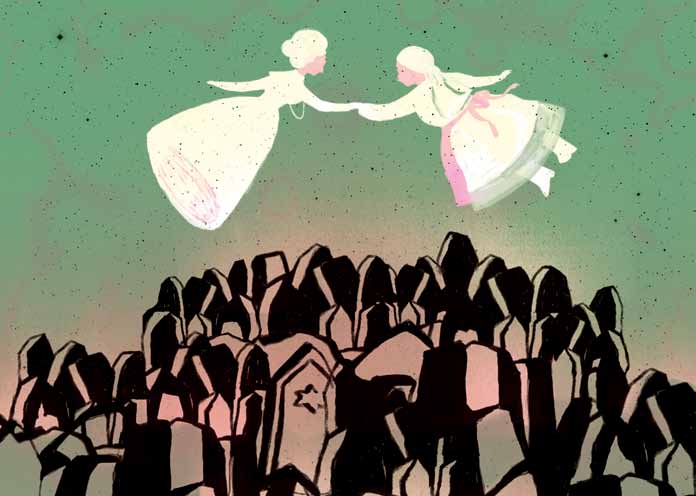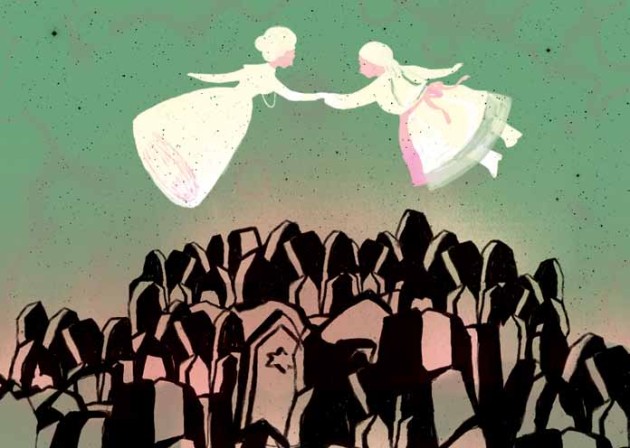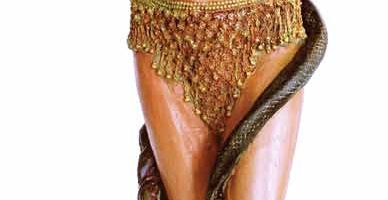
The Lives Under the Stones

- Illustration by Hila Peleg
To get to the Jewish cemetery, you have to go underground. This is true for the living as well as the dead, although it’s been an eternity since fresh ground was broken here. Space was always at a premium; there are only so many bodies you can pack into two acres. They stacked them up like cheerleaders, one on top of the other, knees resting on shoulders or balanced precariously on skulls, but they still ran out of room. Gravestones cracked and toppled under the pressure. By the time the Emperor granted space outside the City, the skies were already darkening. When the storm was finally over, the handful of survivors floated away on floods of tears.
No matter how dry the day is, the stones sweat. Now that the rest of the City hovers a good five feet above, it’s like standing below sea level. Once past the entrance, you spiral down a long, rickety stairway. With each step, the metal squeaks and groans. At the bottom, you’re greeted by a ticket kiosk and a security guard. In the absence of live Jews, the local delinquents have taken to beating up dead ones. Keys, Swiss knives, even nail files are checked into tiny lockers to prevent further damage, although your presence, your mere breath, wreak havoc on the ancient stones. Stray sunbeams rain down, turning the dust mites and gnats into tiny, fluttering jewels, but for the most part, it’s dusk-dark down here. You grab onto details to stay afloat: sculpted colonettes and triglyphs, curlicue arabesques and rolled scrolls, praying hands and lions and fish. Every stone tells a story. The stories press against each other, fighting to be heard, but you only have time for one or two:
Rachel Blumele, 1632 – 1674, her name spelled out in a flower. Beloved wife and mother. A life lived in kitchens and bedrooms and trips to the market. She spent most of her adulthood tucked inside a cotton apron that became tighter and tighter with each pregnancy. After her fifth lying in, the faded check pattern stuck to her like a second skin. She was a good cook, able to turn barley noodles and potatoes into a feast. A magician with liver dumplings, she could make less than a pound of meat feed seven. She saved her best tricks for the market, where she bargained down even the toughest vendors with a look or a plea.
“Here you go, ten zlotys for the apples.”
“Fifteen.”
“Really? I was sure you said ten. I only have twelve. Take two back.” A sigh like an expiring bird. “I guess little Sarai will have to go without.”
Unable to deprive little Sarai/Avram/Natan, the fruit seller/ dairy man/butcher almost always gave Rachel her price.
In another age, Rachel might have been an accountant or a lawyer. Or not. Maybe she loved her kitchen-bedroom-market life. Rachel and her husband regularly made love on their single bed, their slippery bodies somehow managing to click into the right place at the right time, like the workings of a clock. Her wig slept on the shelf so her auburn hair could be free for a few hours. Loose strands framed her prematurely aged face. Dead at 42, she could have been sixty. Eight pregnancies had loosened her taut belly. At night, when the five who had survived infancy were asleep on their bed on the other side of the curtain that divided the room, Rachel’s husband rolled over and massaged her stretched flesh. Stateless, this was his country, the only place he was at home. She smiled as his fingers slowly crept lower. Reluctant to intrude further, you move on.
Salome Karpele, 1744 – 1810. Like everyone else, the first thing you noticed was her beauty. Who could resist those pillowy, pink lips and heavy lidded black eyes? Not the Baron of Ludlovy, who plucked her out of the ghetto at fifteen and installed her in a suite of rooms in the center of town. Her attractions were obvious, but her thoughts were harder to read. After years of playacting, it was possible that Salome no longer knew what she was about.
You check her surroundings for clues. After all, we are what we buy, and Salome was a connoisseur. Only the finest Meissen ware graced her table, although she rarely had more than one guest and the Baron couldn’t distinguish Sevres from Chinese import. Her furniture was French, her pianoforte Italian. Tucked beneath her bed was the expensive magnifying glass she had ordered from the finest craftsmen in Amsterdam so she could check her diamantine face for any flaws. The shelves of her kitchen were lined with jars of the olive oil she used to soften her skin. The pantry was well-stocked with bottles of the finest champagne, which kept her hair bubbly.
At the Baron’s suggestion, she went to Church every Sunday where she prayed for the preservation of her beauty, but the Mysteries remained a mystery. She took communion once, out of curiosity, but felt nothing. How could a tasteless wafer be the body of God? And if Christ died for our sins, what was the point of confession? Only limbo made sense to her; neither Jew nor Gentile, wife nor servant, she knew what it was to float between worlds. She refused to be baptized for fear that the water would wash away the otherness that was as much a part of her appeal as her dainty pointed chin, thin ankles and torrents of wavy, red hair.
“Say something in Jewish,” the Baron would whisper in bed on the nights when his little soldier refused to stand to.
“Kush meer in toches.” “My little Jewess,” was her cue to release the moans that assured her commander that the battle had been won. Since beauty turned as quickly as fine wine, she was determined to acquire other skills to hold onto her Baron. Veiled, she snuck back into the ghetto from time to time to learn how to make the chicken soup and stuffed cabbage that had glued her parents together for so long. Belgian lace failed to hide her charms and groups of boys, fresh out of cheder, would inevitably fall into line behind her, announcing the arrival of the Sabbath bride.
Once she was safely inside her old home, she slipped a stained smock over her silk finery and sank her hands into mounds of grainy chopped liver and squishy small intestines. For a few, brief hours, she breathed in the smells of her childhood and bathed in the comfort of knowing her place. When the late afternoon sun lit up the crumpled paper stuffed into the hole in the window and the chipped brown paint on the walls, she knew it was time to go. Her mother looked away as Salome reached into her bag for a small purse and tucked it under the challah cover. Bending down, she kissed the top of her mother’s head and returned to the house that was not quite her home.
Kartoffeles and liver dumplings bought her some time, but as her thirties bore down on her like a rabid wolf, Salome knew the Baron would get restless. Since jealousy was the strongest aphrodisiac of all, she invented a lover. When she heard the tap of the Baron’s walking stick climbing the stairs to her landing, she had her maid undo her bodice and refasten the buttons out of order. She imprinted the ghost of her ghostly lover in the furniture by spraying cologne on the chairs and divan. The Baron’s nostrils flared the instant he stepped into the apartment. When he noticed the unhooked buttons on her bodice, he insisted on undoing the rest of them himself.
Hoping to catch her in flagrante, he increased his visits. And since no respectable patron arrived at his mistress’ lair empty handed, Salome became one of the wealthiest women in the quarter. When the Baron died and his heir ordered her to leave, it took a full week to pack up her things. Over time, her past was largely forgotten. To the new priest at St. Gundula, she was a respectable, gray-haired lady devoted to Christian charity, but her Jewish roots came out when she died and she was shoved into the old cemetery with the other members of her tribe.
You brush your fingers over the fish sculpted into Salome’s headstone. The rectangular block is capped by a fancy gable. A pair of scrolls frame praying hands. Praying for what, you wonder. Your curiosity twists and turns on itself like an insomniac unable to sleep — did Salome love the Baron, what happened to Rachel’s children?
Back on the crowded street above the cemetery, strangers bump into you, cursing you for getting in their way. “Kush meer in toches,” you whisper in a language you don’t speak as you head for a “kosher style” deli that serves liver dumplings to a non-existent Jewish community.
Amy Bitterman’s fiction has appeared in The Chicago Quarterly Review, The Literary Review, Kerem, Switchback, Jewishfiction.net, Poetica and other publications. She teaches at Rutgers University School of Law-Newark.


